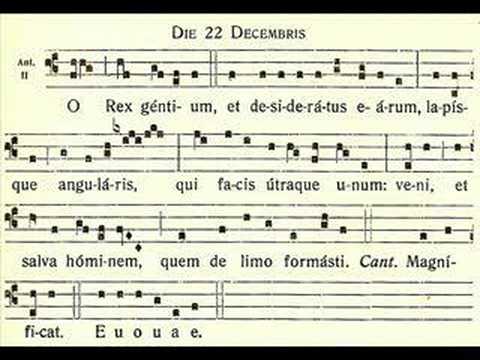O king of the nations, you alone can fulfil their desires: cornerstone, binding all together: come and save the creature you fashioned from the dust of the earth.
Amen. Come, Lord Jesus.
O Rex Gentium,
et desideratus earum,
lapisque angularis,
qui facis utraque unum:
veni, et salva hominem,
quem de limo formasti.
Jeremiah 30.7-11a; Revelation 15:3; Psalm 118:22; Isaiah 28:16; Matthew 21:42; Mark 12:10; Luke 20:17; Acts 4:11; Ephesians 2:20; I Peter 2:6
O come, desire of nations! Show
thy kingly reign on earth below;
thou cornerstone, uniting all, restore the ruin of our fall.
Rejoice! Rejoice! Emmanuel
shall come to thee, O Israel.
O come, thou Key of David, come,
And open wide our heavenly home;
Make safe the way that leads on high,
And close the path to misery.
O Antiphons reflection 1
O Antiphons reflection 2
Visual reflection on these beautiful prayers from New Mellleray abbey in Iowa
From at least the eighth century the antiphon before and after the Magnificat at Vespers (Evening Prayer), for the seven days leading up to Christmas Eve, has greeted Christ with a title starting with “O”. These became the basis of the popular carol “O come, O come, Emmanuel”. The initials, when read backwards, form the Latin “Ero Cras” which means “Tomorrow I come.”
They are now also used , in shorted form, in the Alleluia verses before the days’ Gospel readings.
Each day an O Antiphon could be used for prayer and reflection. These could form the basis of an Advent service with readings, music, and singing. Or of art, banners, or other ways of enhancing the worship environment symbolically. The carol “O come, O come, Emmanuel” and the Magnificat could form significant features in this.



